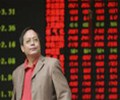

World shares tapped the brakes on Thursday as China troubles struck again, while Europe’s bond markets steadied after confident-sounding ECB policymakers had caused their sharpest selloff in six months.
The Federal Reserve’s annual Jackson Hole policy symposium on Friday made investors steer clear of major moves but there was plenty going on to make the wait interesting.
Asia had seen its first post-COVID outbreak interest rise in South Korea overnight . Chinese markets .CSI300 had tumbled after the country’s most indebted property developer Evergrande 3333.HK warned of a 39% slump in profits , Japan suspended Moderna’s COVID vaccine, while the mood of Germany’s consumers was darkening again.
The pan-European STOXX 600 index .STOXX was down 0.4%, with mining .SXPP, travel and leisure .SXTP and retail .SXRP stocks among the biggest losers. The return of risk aversion steadied euro zone government bond yields ahead of European Central Bank meeting minutes later in the day.
“The most interesting thing we got was the euro sovereign bond market coming alive yesterday,” Saxo Bank’s head of FX strategy John Hardy said, pointing to Wednesday’s sharp pop up in yields that had also pushed up the euro.
“It feels like the market is very complacent though (about the Jackson Hole symposium) and the bar for a surprise is pretty much non-existent.”
Wall Street’s main indexes had notched their latest record high on Wednesday but Asia’s session had been far more bumpy.
MSCI’s broadest index of Asia-Pacific shares outside Japan .MIAPJ0000PUS dropped 0.65%, and U.S. stock futures the S&P 500 e-minis ESc1, shed 0.15%. .N
Chinese bluechips .CSI300 had fallen 2% and Hong Kong .HSI ended down 1%, as a tech rally ran out of steam. The Hang Seng Tech Index, where many of the big Chinese tech firms are listed .HSTECH, fell 1.9%. .SS
Evergrande’s profit warning sent its shares down 7% and the shares of its electric vehicle unit tumbling nearly 20%. 0708.HK
Elsewhere, the Australian benchmark .AXJO lost 0.5% as the country’s new daily coronavirus cases topped 1,000 for the first time. Japan’s Nikkei .N225 ended little changed as the government kept its economic forecasts broadly unchanged.
“The easiest piece to write in global economics right now is the COVID tortoises and hares,” said Societe Generale’s Kit Juckes.
“The zero COVID countries had a cracking start but now it is the others that are leading,” he said, pointing to how restaurant and airline bookings in Europe had been steadily improving whereas places like Australia were tough.
POLICY CHANGES
The global inflationary pulse was also in the headlines as the South Korean central bank lifted its base rate off a record low, the first major economy in Asia to do so.
Governor Lee Ju-yeol maintained his hawkish tone and suggested the bank could further tighten policy as data showed Asia’s fourth-largest economy was overheating.
Central banks around the world are laying the groundwork for a transition away from crisis-era stimulus as what began as emergency support now overheats many economies.
Investors and policymakers are particularly focused on what Fed Chair Jeremy Powell signals at Jackson Hole on Friday.
“Ideally, the Fed would like to observe as long as possible, (and)…make sure that the economy is well on track towards growth,” Raghuram Rajan, former RBI governor and finance professor at the University of Chicago Booth School of Business, told the Reuters Global Markets Forum on Wednesday. “Of course, the problem is the Delta variant, plus whatever variants are lurking in the background.”
Treasury yields inched down in Asia but were rising again in Europe. The yield on benchmark 10-year Treasuries US10YT=RR was last 1.35% compared with 1.33% in late Asian trading.
The dollar was edging up too, sitting 0.1% higher at 1.1757 per euro EUR= and buying 110.16 Japanese yen =USD.
In commodity markets, oil prices fell after three days of gains, with Brent crude LCOc1 down 0.9% at $71.56 per barrel O/R and U.S. crude CLc1 dipped 1.2% to $67.5 a barrel. Gold and iron dipped 0.3% and 0.8% respectively in metals markets.
Source: Reuters (Additional reporting by Alun John in Hong Kong Editing by Tomasz Janowski)